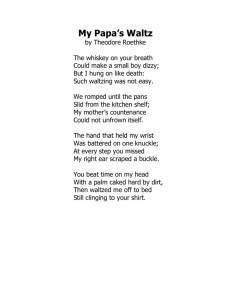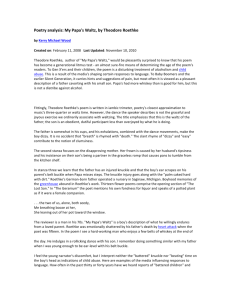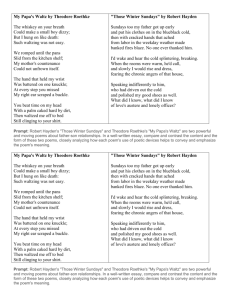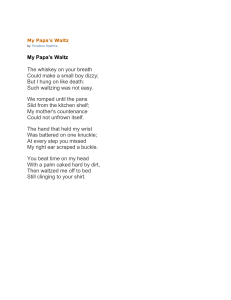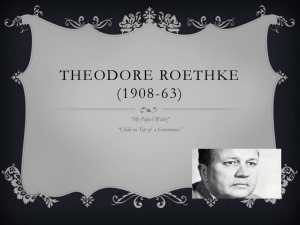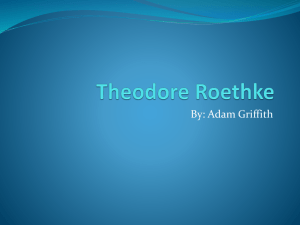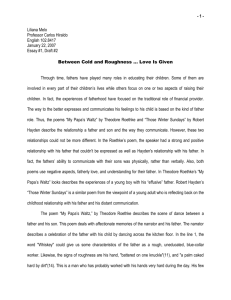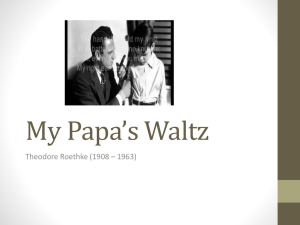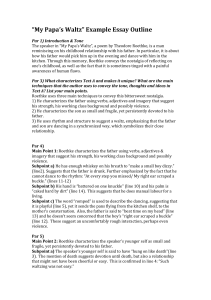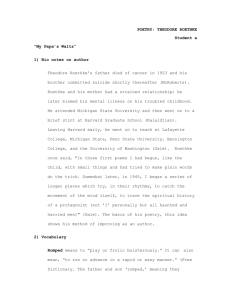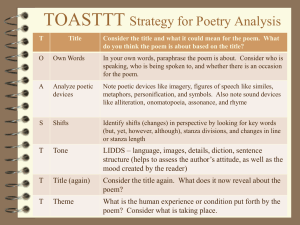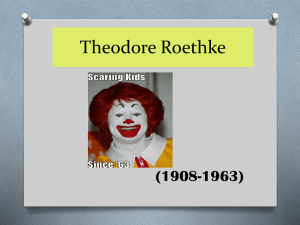My Papa`s Waltz (1942)
advertisement
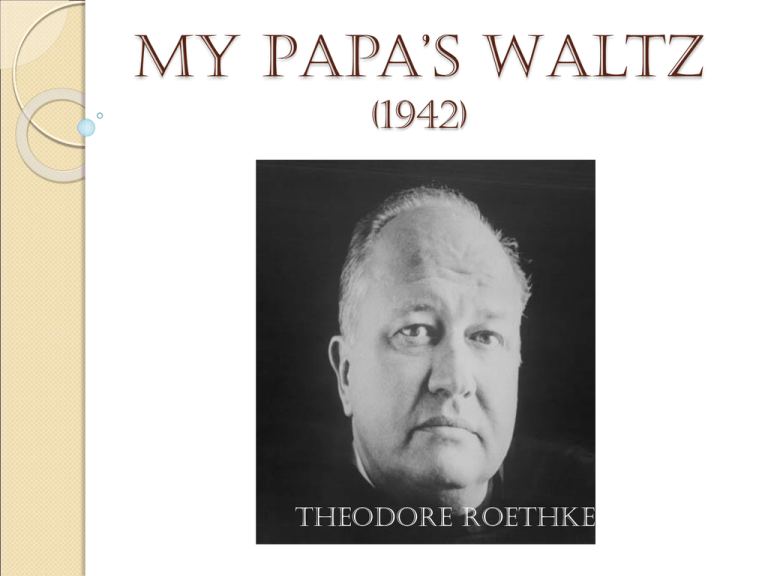
My PaPa’s Waltz (1942) Theodore Roethke Biography Roethke was born in Saginaw, Michigan on May 25, 1908 and died on August 1, 1963 due to a heart failure at the age of 60. Roethke’s works is characterized by deep meanings, rhythm and natural imagery. In 1954 he was awarded the Pulitzer Prize for poetry for his book, The Waking. He also won the anual National Book Award for Poetry twice during 1959 for Words for the Wind and The Far Field in 1965. His first book, Open House (1941), showed the strong influence of Robert Frost. Roethke’s childhood was mostly spent in a greenhouse owned by his father and uncle which was reflected in his poetry in the form of natural images. Roethke’s adolescent years were jarred by his uncle’s suicide and the death of his father from cancer during 1923 when he was only 14. Their deaths was what shaped Roethke’s psyche and creative life. Throughout his lifetime Roethke also taught at several colleges and universities such as Harvard, Lafayette, and Bennington. During the last years of his life, Roethke wrote 61 new poems which were published in The Far Field. Historical/Social Background My Papa’s Waltz was written in 1942. Most of his poems refer back to his childhood. This poem is about his relationship with his father. He loves him, but also fears him at the same time. When his father died of cancer when he was 15, he went into depression and mental illness. People liked his poem because it expressed a love-hate relationship between father and son and conflicts as well. Readers think the poem is about child abuse but some think it is just about a father dancing with his son. My Papa’s Waltz By: Theodore Roethke The whiskey on your breath Could make a small boy dizzy; But I hung on like death: Such waltzing was not easy. We romped until the pans Slid from the kitchen shelf; My mother's countenance Could not unfrown itself. The hand that held my wrist Was battered on one knuckle; At every step you missed My right ear scraped a buckle. You beat time on my head With a palm caked hard by dirt, Then waltzed me off to bed Still clinging to your shirt. Analysis of My Papa’s Waltz My Papa’s Waltz has a simple ABAB rhyme. “The whiskey on your breath (A) Could make a small boy dizzy; (B) But I hung on like death: (A) Such waltzing was not easy. (B)” Explanation of My Papa’s Waltz On lines 1 and 2 there's no outright violence but these lines establish that Papa is drunk, a situation that can lead to violence. One line 3 the speaker has slipped in the ultimate end to violence (or anything, really) – death. This line is an example of a simile, because the boy hung on "like" death. He's holding on to his father so hard that he's as inescapable as death. In what could be a happy poem about this father and son's relationship, we see death creep in to frighten us right from the start. On lines 9 and 10 The father holds the son's hand to lead him in the dance but, because his knuckle is battered, this posture seems, if not violent, at least rough. "Battered" is an intense word to use for a knuckle, and implies some lurking violence. On lines 11 and 12 the father doesn't seem like he's being violent intentionally here, but he's accidentally hurting his kid. Maybe the kid is too scared to speak up and say "ow" when his ear scrapes his dad's belt buckle. The belt also reminds us of how belts have often been used to punish children. On line 13 the use of the word "beat" must be telling us something here, because you can "keep" time just as well as you can beat it, but "beat" carries a more violent connotation. "Beat" fits with the word "battered," which was used to describe the father's knuckles. Throughout this poem, subtle word choices create an undercurrent of violence. Significance of My Papa’s Waltz This poem drew me in with its name. It sounded like it would be about a sweet memory of a father and child, but it can be noted that there are lingers of violence. What makes it even more interesting is that it can be interpret in more than one way; some say that it is indeed about a sweet memory of a son and father roughhousing, others say it is about child abuse. This shows the importance of understanding poetry. It can be interpreted in more than one way and each way can be vastly different from each other. But in the end neither way is right or wrong. Elegy For Jane By: Theodore Roethke I remember the neckcurls, limp and damp as tendrils; And her quick look, a sidelong pickerel smile; And how, once started into talk, the light syllables leaped for her. And she balanced in the delight of her thought, A wren, happy, tail into the wind, Her song trembling the twigs and small branches. The shade sang with her; The leaves, their whispers turned to kissing, And the mould sang in the bleached valleys under the rose. Oh, when she was sad, she cast herself down into such a pure depth, Even a father could not find her: Scraping her cheek against straw, Stirring the clearest water. My sparrow, you are not here, Waiting like a fern, making a spiney shadow. The sides of wet stones cannot console me, Nor the moss, wound with the last light. If only I could nudge you from this sleep, My maimed darling, my skittery pigeon. Over this damp grave I speak the words of my love: I, with no rights in this matter, Neither father nor lover. Analysis of My Elegy For Jane In My Elegy For Jane form and meter is used. Here are some examples: And how, once start-led in-to talk, the light syll-a-bles leaped for her Nor the moss, wound with the last light. Over this damp grave I speak the words of my love The words in bold are stressed while the words not in bold are not emphasized. Comparison of My Elegy For Jane and My Papa’s Waltz Both poems have to do with depressing matters, and for this reason, they are both portrayed negatively. The poems are also tied together because of music; in “My Papa’s Waltz”, they were dancing, and in “My Elegy For Jane”, they were singing. Original Work: Quiet Every morning, I wake up In a white room and Put on my clothes and Leave Blankly staring on the train I see my friends and I say nothing In the classroom The teacher tells me to speak up Quiet On a note, my mother wrote Left on a table at home It said “My child cannot speak Today he has laryngitis. By: Anna Chan Original Work: Depression Dragging my feet Down the long hallways Drowning in the sweat and heat Walking into the classroom Wanting some cold air Wishing for an AC But to my disappointment Breaking my heart Because there is no AC By: Chu Miao Wang Original Work: Invisible Looking out the window to the sky I saw a fly Passing by All alone in this dark house With a mouse Everyone left no one stay With each passing day I feel loner Everyone forgot even the owner I was still here Waiting to be hear But no one remember I want to be together With everyone But I can’t find anyone I am invisible Zhang By: Kelly Original Work: Busy I heard the rare sound of the wind But the busyness of the city quickly resumed Cars honking; profane language People rushing by to get to work on time And not a single person pauses To listen to the sound of the wind By: Winnie Lee Works Cited Biography of Theodore Roethke. N.p., n.d. Web. 01 June 2013. <http://www.poemhunter.com/theodoreroethke/biography/>. "Elegy for Jane Analysis." Shmoop. N.p., n.d. Web. 04 June 2013. Ellmann, Richard, and Robert O'Clair. The Norton Anthology of Modern Poetry,. New York: Norton, 1973. Print. "My Papa's Waltz Analysis." Shmoop. N.p., n.d. Web. 04 June 2013. "Theodore Roethke." Soylent Communications, n.d. Web. 01 June 2013. <http://www.nndb.com/people/585/000099288/>. Molesworth, Charles. "Roethke, Theodore." Grolier Multimedia Encyclopedia. Grolier Online, 2013.Web. 6 June 2013.
